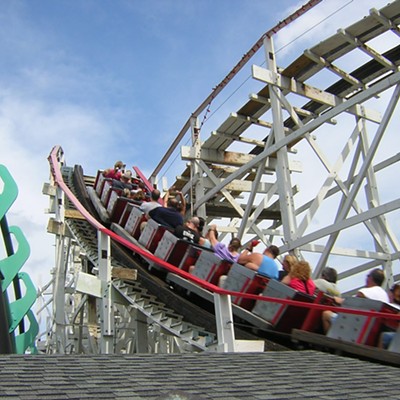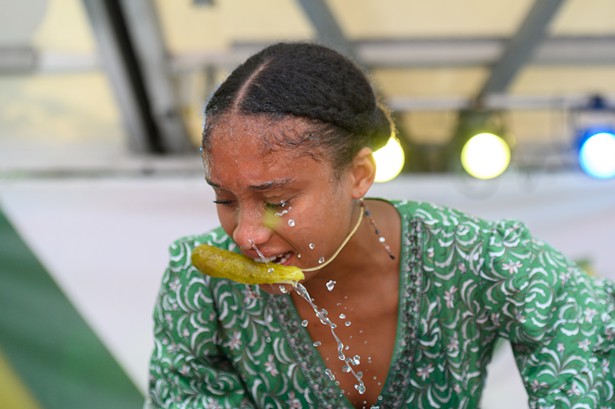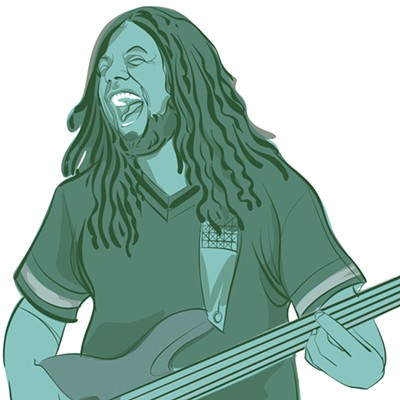Very little distinguishes Rescue Dawn from other movies of its kind, except for its director: This is a film by Werner Herzog, the visionary German whose dramas and documentaries are among the cinema's most original and idiosyncratic. He helped launch the New German Cinema in the 1960s, in the invigorating shadow of the French New Wave, and he's made valuable films ever since, most recently Grizzly Man.
This time, he's remaking a film, sort of, and the film he's remaking is his own. In 1997 Herzog released Little Dieter Needs to Fly, a documentary about Dieter Dengler, an American pilot whose plane went down in 1966 during a top-secret and highly illegal sortie over Laos in the emerging and largely clandestine Vietnam War. He was captured, tortured, imprisoned in the jungle, and he eventually escaped. He died 30 years later, after four more plane crashes, in San Francisco, where he lived.
In Little Dieter, the subject himself tells his slightly incredible story, from long-ago memories, and Herzog narrates in the slow lugubrious voice that cineastes have come to cherish. But for Rescue Dawn, actors and action re-tell the tale, which seems terribly familiar when presented as drama rather than documentary.
Herzog opens Rescue Dawn with one of his trademark visual elegies: an airplane drops slow-motion bombs over a tropical Southeast Asian jungle, and the fireballs rise up to engulf the firmament. The music we hear on the soundtrack is much too beautiful for the images that accompany it. Then, we meet Dieter (Christian Bale), who was born in Germany, witnessed the bombings of World War II, and is now an American who joined the militray to fly, not to go to war.
Soon he flies his first mission, and just as soon he gets shot down. (The special effects of his crash are amusingly archaic, like something from a '60s film.) He's captured, tortured a little, then asked by his captors to sign a statement declaring his support for the peace-loving people of etc. etc. A patriot, he refuses. So he's thrown into a jungle prison with two Americans (Steve Zahn, Jeremy Davies) and three Asians. More torture follows at the hands of five or six shrill Laotian stereotypes, and then a plan to escape.
Herzog's seamless narrative holds our interest, but it does so largely without a point of view. The dialogue and the construction of character seem calculated to seem calculated, and nothing feels like an accident, which contradicts Herzog's claims that he likes to explore and invent during filming. Perhaps it's to his credit that even his spontaneity is somehow just right. His over-lit color photography gives the film a washed-out look, and the makeup effects, as the prisoners' faces grow scarred from abuse, is outstanding.
The film bears other Herzogian markings, particularly its realism. At its best, Rescue Dawn reminds us of what prisoners like Dieter must have endured: Those worms are absolutely alive and squirming as Bale shovels them into his mouth, and so are the leeches that he and Zahn pull off themselves in the river. Later, Bale catches a snake and peels off its skin with his teeth to get to the raw bloody meat inside.
All of the actors perform well, and all of them lost weight during filming to depict their characters' physical decay. Davies' work especially stands out, although from the moment he appears on screen, he looks like he died three pounds ago. One suspects that no actor should have to do this for a role.
Bale, an actor whose work I can't seem to embrace, is incapable of not being charming (see American Psycho), and that's how Dieter survives: by not believing in what's happening to him, that his life is in danger and that he could die. This makes him a classic Herzog wacko after all. Dieter talks to his captors rationally, in English they don't understand, just like Grizzly Man talked to the bears, who killed him. But Dieter is still a more grounded and accessible Herzog man-on-the-edge; Aguirre, the Wrath of God, Herzog's masterpiece, presents the most unreconcilable version of his archetype.
On the one hand, I wonder how many people will get Herzog's film. On the other, there may not be too much they need to get. In Aguirre, when heads rolled, they literally rolled. In Rescue Dawn, when a machete execution occurs it is off-camera, no doubt at the command of one of the movie's seven executive producers.
Herzog closes Rescue Dawn with the bombastic cliché of Dieter's homecoming before a throng of cheering colleagues back at his military base, where someone sticks a microphone in his face and asks him if he believes in God. "I believe I want a steak," he says. And does he have any words of wisdom from his ordeal? "Empty what is full, fill what is empty, scratch where it itches," he tells them. Then they hoist him on their shoulders, and when he smiles, Herzog freezes the action and fades to black.
Behind me, as the theater began to empty, an older fellow said contentedly, "The ending was very good." I wanted to ask him which part of the ending he meant. But somehow, after watching a Werner Herzog film, an enigma -- however small -- seemed more appropriate. 
Starts Fri., July 27.













